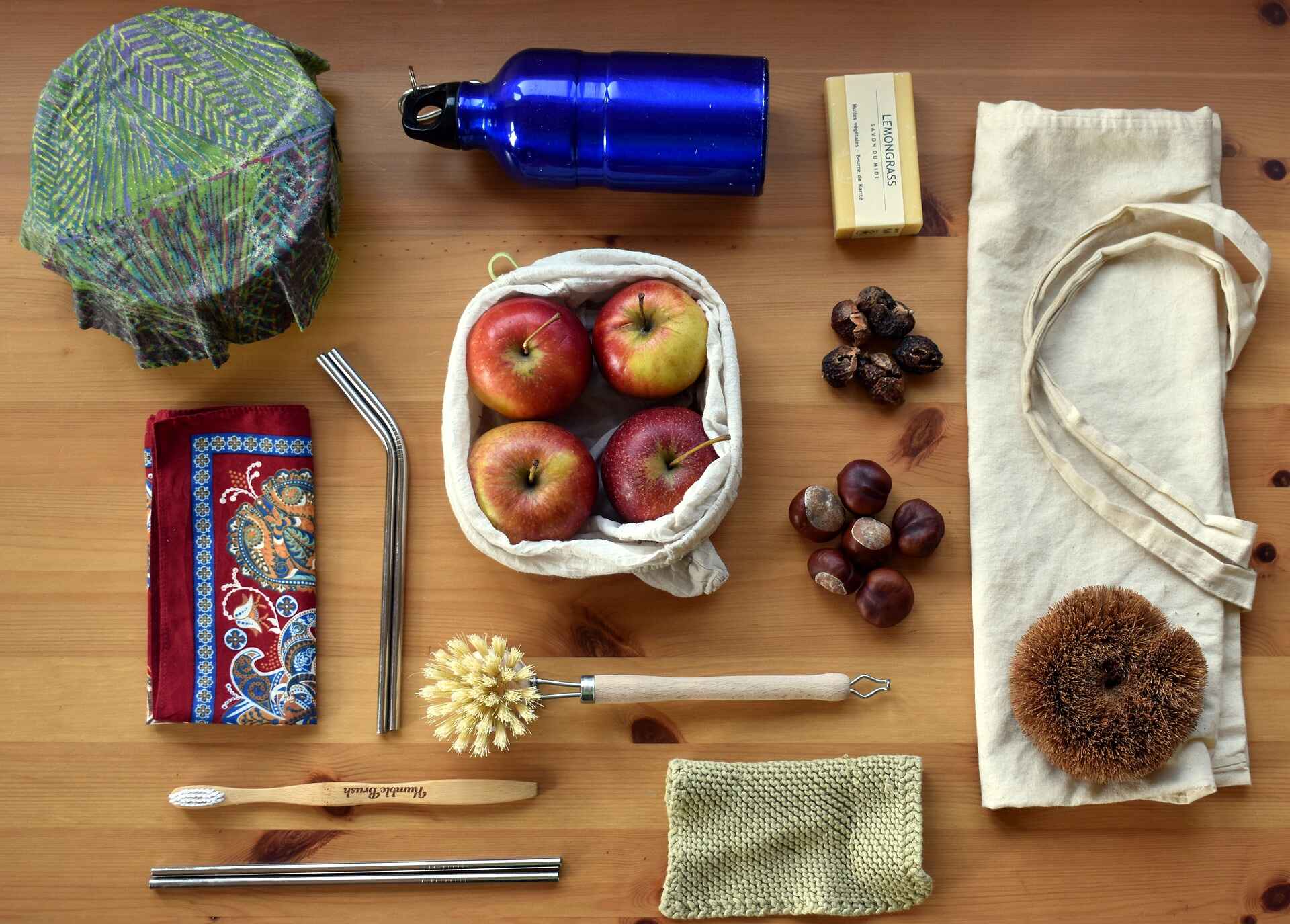Less waste in the kitchen and for the household

In our homes, the kitchen usually has the heaviest load of plastics and single-use products This perfectly illustrates how our society favours convenience and speed over our future.
Here are some tips to help you reduce your ecological footprint in the kitchen and when cleaning.
In the kitchen, single-use consumables can easily be replaced by sustainable alternatives:
- To wipe up a stain or spilled drink on the floor, use a cloth or sponge instead of disposable paper towels. Keep some rags or pieces of old towel in a drawer, chuck them in the wash after use, and that’s it!
- The same applies to paper napkins. Whether at home or on a picnic, it is just as convenient to have cloth napkins that you can wash when dirty.
- In most cases, baking/greaseproof paper can be replaced by a non-stick silicone mat that is easy to clean after use.
To preserve leftovers or food, you can limit the use of aluminium foil, kitchen film and freezer bags.
The first step is to use plastic boxes that are already in your cupboards, or glass jars (after you have used up the original contents).
These options work equally well at room temperature, in the refrigerator or in the freezer (just be careful not to overfill the containers to avoid breakage during freezing).To cover an open container, simply place a plate on it.
Freezer bags can be cleaned and reused.
To cover an open container, simply place a plate on it.
There are also fabric or silicone wraps (cling film eco-alternatives) that fit over bowls of all sizes.
You can buy waxed fabrics (e.g. Bee's Wrap) in organic stores or make them yourself (many tutorials available online). These waxed fabrics are also useful for packing fruits (opened or not), a sandwich, fresh herbs,...
Compost
Organic waste such as fruit and vegetable peel, some leftovers from meals, coffee grounds or tea can be composted rather than thrown in the household garbage.
There are several options: a composter in the garden or in the neighbourhood, a vermicomposter (worm farm) on the balcony or a special bio-waste bin collected by the municipality.
In the latter case, be careful to comply with the municipality's recycling instructions, because all the non-compostable waste thrown into the compost ends up in the fields, then on the dinner table...
The "Espace Jeunesse et Education de Chavornay (CH - canton de Vaud)" shot three mini-videos on the sorting of bio-waste, called "Pour un compost en meilleur santé (For healthier compost)". Episode 201 (strid.ch), Episode 202 (strid.ch), Episode 203 (strid.ch)In Luzern, more information can be found on the Real-Luzern website Grüngut (real-luzern.ch)
Utensils and appliances
When you want to buy a new appliance or a new kitchen utensil, always ask yourself whether the purchase is really necessary.
Do I already have a device or utensil that does the same thing? Can I repair the one that no longer works, or have it repaired?For your utensils, avoid plastic - choose ones made of wood or metal (stainless steel), they will last longer.
If you already have plastic ones, don't throw them away, it would be counterproductive!
Doing the dishes
Avoid synthetic sponges at all costs, they are made from oil byproducts and not biodegradable.
Vegetable sponges are a little more environmentally friendly. Other eco-friendly alternatives are available too: wooden brushes with vegetable fibers or horsehair, washable sponges, fabric sponges or tawashi you can make yourself by recycling old tights, fabrics or socks (many tutorials are available online).
You can buy dishwashing liquid or detergent in bulk in specialized stores. Alternatively, you can also rub your brush or sponge on a block of Marseille Soap or solid dish soap (recipe in the guide at the end of the article).
Household products
Avoid so-called miracle products, especially those with a hazard symbol or the statement "avoid contact with food" written on them.
Remember that “elbow grease” may sometimes be slower, or more demanding (not always!) but will always be less polluting than its chemical equivalent.As with dishwashing liquid, you can buy household products in bulk in specialized stores.
Since there are still only a few such places, another option is to make your own products from a few basic ingredients: white vinegar, black soap, Marseille soap, baking soda, citric acid, coarse salt and some essential oils (recipes in the guide at the end of the article).A special white clay stone (such as Biostein) can be used to replace several products.
If you need to buy household products, always go for those with a known ecological label, they will pollute the water less. And of course, ban single-use wipes!
To go further:
- Think about limiting your hidden waste, especially water polluted by household products.
- Let your favourite brands know that you are now choosing brands that minimize packaging and water pollution.
- Homemade all-purpose cleaner (Zero Waste Switzerland)